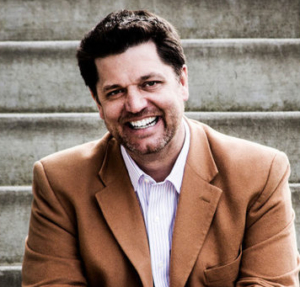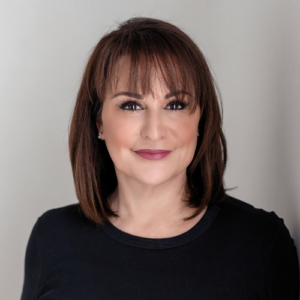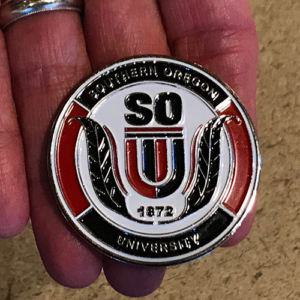NEWS RELEASE
(Ashland, Ore.) – Five new and six continuing members have been appointed by Gov. Kate Brown and confirmed Wednesday by the Oregon Senate to serve on the Southern Oregon University Board of Trustees.
The new trustees are SOU faculty member Deborah Rosenberg; Jonathon Bullock, executive director of the Redmond Proficiency Academy; organizational development consultant Megan Davis Lightman; SOU alumnus Shaun Franks, who works in the solar energy industry; and Barry Thalden, a retired architect and local philanthropist.
“The Board of Trustees is excited to welcome these fine Oregonians to SOU,” said Bill Thorndike, the board’s chairman. “The individual expertise of each will enhance and complement our board’s composition.
“We appreciate Gov. Brown’s appointment and legislators’ confirmation of these community leaders to our board,” Thorndike said. “Trustee service allows SOU to continue nimbly preparing for and responding to the changing landscape of higher education and the unique needs of our students.”
Returning to serve second terms as trustees are Thorndike, who has served as the board’s chair since its inception; fellow original board members Lyn Hennion, Les AuCoin, Paul Nicholson and Steve Vincent; and Sheila Clough, who was appointed last year to fill a board vacancy.
The terms of all new and reappointed trustees begin July 1 and run through June 30, 2022, except for that of the faculty member, Deborah Rosenberg, whose term is two years.
Outgoing SOU faculty member Dennis Slattery and community members April Sevcik, Teresa Sayre and Shea Washington are completing their service June 30 as members of the SOU Board of Trustees.
“I thank those trustees who are retiring from our board for their dedication and contributions to the good of the university,” Thorndike said. “SOU is stronger today because of their service.”
Continuing trustees are student Shanztyn Nihipali, SOU alumnus Daniel Santos of Salem and SOU staff member Joanna Steinman.
“On behalf of the university, I would like to thank all of our trustees – whether new, continuing or retiring – for their commitments to serving SOU,” President Linda Schott said. “As we continue our journey of advancement at SOU, we recognize the essential role of our trustees in helping advance our higher education goals in the region and state.”
SOU was granted authority by the state to form its own independent Board of Trustees beginning July 1, 2015, following the legislature’s dissolution of the Oregon University System and State Board of Higher Education. SOU’s board is responsible for governance and oversight of the university.
Trustees are gubernatorial appointees, subject to confirmation by the Oregon Senate. As many as 11 at-large trustees serve four-year terms and one position each is reserved for an SOU student, a faculty member and a non-faculty staff member, each of whom serve two-year terms.
Trustees are limited to serving two consecutive full terms. The university president serves in a non-voting, ex officio capacity on the board, bringing total membership to 15.
New trustees
Deborah Rosenberg
Rosenberg is a professor who teaches costume design, costume construction, stage makeup and costume history in the SOU Theatre Department. She is the outgoing chair of the university’s Faculty Senate. Rosenberg served previously as costume designer and costume shop supervisor at Ithaca College in New York, and has designed costumes for the State University of New York at Brockport and at New York’s Niagara University. Her professional credits include costume designs for the Alley Theatre in Houston; the Berkshire Theatre Festival in Stockbridge, Mass.; and Shakespeare and Company in Lenox, Mass. Rosenberg holds a bachelor’s degree in anthropology from Trent University in Ontario and a master of fine arts degree in costume design from North Carolina School of the Arts.
Jonathon Bullock
 Bullock is executive director and co-founder of the Redmond Proficiency Academy, a Central Oregon charter school that emphasizes proficiency-based learning in a personalized environment. He served the Oregon Association of Student Councils as a counselor and motivational speaker, and is a past executive council member for the National Association of Student Councils. Bullock has also taught administrative and teacher preparation courses at Portland’s Lewis & Clark College and Concordia University. He received his bachelor’s degree in liberal arts and sciences from Oregon State University, his master’s degree in secondary education from Willamette University and his doctorate in learning assessment and system performance from the University of Oregon.
Bullock is executive director and co-founder of the Redmond Proficiency Academy, a Central Oregon charter school that emphasizes proficiency-based learning in a personalized environment. He served the Oregon Association of Student Councils as a counselor and motivational speaker, and is a past executive council member for the National Association of Student Councils. Bullock has also taught administrative and teacher preparation courses at Portland’s Lewis & Clark College and Concordia University. He received his bachelor’s degree in liberal arts and sciences from Oregon State University, his master’s degree in secondary education from Willamette University and his doctorate in learning assessment and system performance from the University of Oregon.
Megan Davis Lightman
 Davis Lightman is the CEO and founder of The Davis Consulting Group, Inc., a Medford organizational development consulting firm for boards of directors and leadership teams nationwide. She has led the strategic transformations of various companies and non-profit organizations. She serves on the boards of directors of the Rogue Community College Foundation and the Chicago-based SmithBucklin management company, and serves on the Southern Oregon Leadership Council for the Oregon Community Foundation. She received her bachelor’s degree in political science from Tulane University and her master’s degree in organizational development from the Quinlan School of Business at Loyola University Chicago.
Davis Lightman is the CEO and founder of The Davis Consulting Group, Inc., a Medford organizational development consulting firm for boards of directors and leadership teams nationwide. She has led the strategic transformations of various companies and non-profit organizations. She serves on the boards of directors of the Rogue Community College Foundation and the Chicago-based SmithBucklin management company, and serves on the Southern Oregon Leadership Council for the Oregon Community Foundation. She received her bachelor’s degree in political science from Tulane University and her master’s degree in organizational development from the Quinlan School of Business at Loyola University Chicago.
Shaun Franks
Franks is a 2014 SOU alumnus who studied business, environmental studies and corporate sustainability. He studied renewable energy in Germany in 2011 through the SOU School of Business. As director of sustainability for student government a year later, he helped establish the SOU Green Fund, which invests student fees in local energy, water and campus sustainability projects – including three solar installations at SOU, the purchase of water offsets and creation of The Farm at SOU. Franks works in sales and marketing for True South Solar, an SOU alumni-owned local business in Ashland. He serves on the policy committee of the Oregon Solar Energy Industry Association; is a founder and board treasurer of Rogue Climate, a local environmental nonprofit; and is chair of the McKenzie River Gathering Foundation’s grant-making committee.
Barry Thalden
Thalden and his wife, Kathryn, retired to Ashland in 2012, after he founded and guided the Las Vegas architectural firm Thalden Boyd Emery Architects for 43 years. The firm – which also had offices in St. Louis, Tulsa and Phoenix – specialized in designing resorts, casinos and other large-scale projects. Thalden is a retired member of the American Institute of Architects and was elected as a fellow of the American Society of Landscape Architects after serving as its national vice president. Since moving to Ashland six years ago, the Thaldens’ generosity has led to the flower basket program in downtown Ashland; murals outside the Ashland Emergency Food Bank and on Calle Guanajuato on the Ashland Plaza; and an Ashland-themed mural in Ashland’s Mexican sister city of Guanajuato. Their philanthropy is responsible for the new Thalden Pavilion at The Farm at SOU. Thalden received a double degree in architecture and engineering at the University of Illinois and a master’s degree in planning at the University of Michigan.
-SOU-




 “She’s a classic unsung hero – one of those many employees working hard, mostly behind the scenes – and she does a great job,” says Vice President for Finance and Administration Greg Perkinson, who joined President Linda Schott and Board of Trustees Chair Lyn Hennion in surprising Kathy with the award.
“She’s a classic unsung hero – one of those many employees working hard, mostly behind the scenes – and she does a great job,” says Vice President for Finance and Administration Greg Perkinson, who joined President Linda Schott and Board of Trustees Chair Lyn Hennion in surprising Kathy with the award.


 Bullock is executive director and co-founder of the Redmond Proficiency Academy, a Central Oregon charter school that emphasizes proficiency-based learning in a personalized environment. He served the Oregon Association of Student Councils as a counselor and motivational speaker, and is a past executive council member for the National Association of Student Councils. Bullock has also taught administrative and teacher preparation courses at Portland’s Lewis & Clark College and Concordia University. He received his bachelor’s degree in liberal arts and sciences from Oregon State University, his master’s degree in secondary education from Willamette University and his doctorate in learning assessment and system performance from the University of Oregon.
Bullock is executive director and co-founder of the Redmond Proficiency Academy, a Central Oregon charter school that emphasizes proficiency-based learning in a personalized environment. He served the Oregon Association of Student Councils as a counselor and motivational speaker, and is a past executive council member for the National Association of Student Councils. Bullock has also taught administrative and teacher preparation courses at Portland’s Lewis & Clark College and Concordia University. He received his bachelor’s degree in liberal arts and sciences from Oregon State University, his master’s degree in secondary education from Willamette University and his doctorate in learning assessment and system performance from the University of Oregon. Davis Lightman is the CEO and founder of The Davis Consulting Group, Inc., a Medford organizational development consulting firm for boards of directors and leadership teams nationwide. She has led the strategic transformations of various companies and non-profit organizations. She serves on the boards of directors of the Rogue Community College Foundation and the Chicago-based SmithBucklin management company, and serves on the Southern Oregon Leadership Council for the Oregon Community Foundation. She received her bachelor’s degree in political science from Tulane University and her master’s degree in organizational development from the Quinlan School of Business at Loyola University Chicago.
Davis Lightman is the CEO and founder of The Davis Consulting Group, Inc., a Medford organizational development consulting firm for boards of directors and leadership teams nationwide. She has led the strategic transformations of various companies and non-profit organizations. She serves on the boards of directors of the Rogue Community College Foundation and the Chicago-based SmithBucklin management company, and serves on the Southern Oregon Leadership Council for the Oregon Community Foundation. She received her bachelor’s degree in political science from Tulane University and her master’s degree in organizational development from the Quinlan School of Business at Loyola University Chicago.

